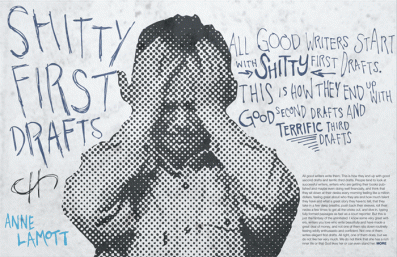In over fifteen years of writing, I have rarely not ‘felt like writing.” Usually, I am frustrated that with a full-time job, family etc., that I don’t have enough time. I have expounded on this blog before about writing every day and I mean it. My absolute non-medical opinion is that there is a creative muscle somewhere in our bodies and, like the biceps and six-pack, it needs to nurtured…every day. Actually, when I went online for images to add to the blog, I see I am not alone in this thought.
Fortunately, I look on writing more favorably than the gym. I subscribe to the tweet they show all the time on the 24 Hour Fitness screens: “I really regret that work out…” said no one, ever. But I often need to drag myself to the gym, usually by chastising myself that I am wasting the membership I am paying for.
Not so with my writing. I write in hour-long slots, just before work, just after work and before chasing the bus, after the dinner is cleared away and kids settled. I attack it with a vengeance, stopping reading an article about my soccer team or politics, because it’s 8am and the clock starts ticking.
So today (Sunday) took me by surprise. I rose from a good night’s sleep and drove to a Peets coffee shop where my son was working, and over a turmeric latte settled in to write. But I really didn’t feel inspired. I thought of checking soccer reports, basketball playoff reports, even discover more factual conjecture on the Muller Report. Yeah, I felt that resistant.
The strange part is that I am over midway through writing my latest novel. I know where the characters and I are going, and there are no problems that I can see (I’m not sure the characters are as confident). I cannot explain why I was felt so resistant, but I drank my coffee and ground it out.
Even an old Englishman from my hometown who was a friend of Alfred Peet couldn’t knock me off my stride (though you are about to become a character in my latest novel, Nigel. That’ll teach you to distract me!).
I have not read what I wrote. I think it was about two-thirds of a chapter. I have a feeling it is bad, even by Anne Lamott’s shitty first draft standards. It will likely be heavily edited, rewritten, or ripped up (if I ever bother to print it).

But it was important that I sat down and wrote. It feels like when you ease up once on a run or set of exercises, it just becomes too easy to do it again.
I wrote today…and I will write tomorrow. There is no room for doubt.
Good Writing,
Alon Shalev
ps – in case you haven’t seen, my website URL has changed to http://www.alon-shalev.com. Find out why here.
——————————————————————————————————
Alon Shalev is the author of the 2013 Eric Hoffer YA Book Award winner, At The Walls Of Galbrieth (ebook currently at 99c) and five other Wycaan Master books all released by Tourmaline Books and available in KU. Sign up for more information about Alon Shalev at his author website.













